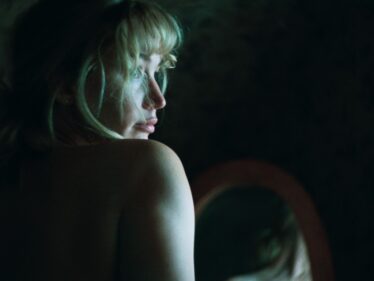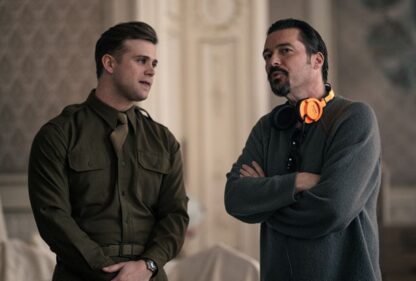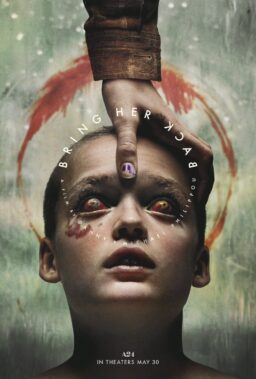So thank God for tape recorders, because in the old pen-and-paper days, this would be the act of a desperate man, trying to keep up with Quentin Tarantino, who talks like he’s being paid by the word and starts every sentence in the middle of the previous one.
We’re sitting in the corner of this cavernous ballroom on the top floor of the Carlton Hotel at the Cannes Film Festival. Way cool. Tarantino’s got the biggest hit at the festival, “Pulp Fiction,” and in a couple of days, they’re going to give it the Palme d’Or, which is the Grand Prize in any language.
“Five years ago about now, yeah, was the last year in the video store,” he is remembering. It is part of the folklore that Tarantino worked in a video store, devouring movies by the thousands, by the pound, by the yard, letting them churn in his imagination and then writing lurid, violent, macho screenplays that were born to be called “Pulp Fiction” or “Reservoir Dogs” or “True Romance,” titles like that.
He’s 31. I met him the first time when he was 29. Two years ago, when he brought “Reservoir Dogs” to Cannes, he was happy to sit at a table on the beach and eat spaghetti. Now the whole top floor of the Carlton has been roped off for him.
Bruce Willis and John Travolta, two of the stars of “Pulp Fiction,” are also at the festival, angling to get a word in edgewise, because Tarantino is a joyous, arm-waving, head-shaking, table-pounding cascade of cinematic theory and big plans. This is the only man I know who makes Jay Leno look like he has an ordinary chin. Tarantino’s jaw juts out like a figurehead, parting the waves in advance of his opinions. And he has all these . . . theories.
If you ever get a chance to see a movie named “Sleep With Me,” you’ll understand what I mean. This is a low-budget film made by a friend of Tarantino’s, and in a cameo role, Tarantino plays a party guest. He plants himself in the middle of the floor and loudly explains why “Top Gun” is actually a homosexual love story. How the Navy pilots love one their jet planes are phalluses, and when one flies upside-down right above another one, well, how plain can it get? “Come over to the GAY SIDE!” he shouts. “That’s the message!”
Tarantino’s theory actually makes a certain amount of sense. I wonder if he talked it over with Tony Scott, who directed not only “Top Gun,” but also “True Romance,” last fall’s crimefest, which was written by Tarantino. Doesn’t matter. The point is, Tarantino is always loudly explaining a theory. He talks so much, he’d be a bore if he weren’t so interesting. A rambling man
I ask him whether he thinks there is any correlation between violence on the screen and violence in society. Not an original question, but a conversation opener when a guy has just directed a movie with some of the more unique forms of mayhem ever seen on the screens of Cannes. Here is every word of his answer, because I want you to understand how he talks:
“OK! My answer is the easiest answer in the world, to me: It’s just a movie and that’s the way I feel! However, while I do not believe there is absolutely any correlation of people seeing a movie and going out and acting it out in real life, and as an example, people go, ‘Well, what about the Borgias? There were no movies back then.’ Well, even more important, what about Tokyo? It’s the safest city I’ve ever been in, and they have the most violent cinema I’ve ever seen. However, how much society and the image we see go hand-in-hand, I don’t know the answer to that. However, I do know that I’m a good person, yet I grew up watching ‘The Wild Bunch’ and ‘Deliverance’ on a double-feature when I was 11 years old. All right, you know?”
“So the bottom line is, my No. 1 responsibility is not to society at large; it’s to my characters. And to be true to them. If you had to stop and think what some idiot might do after seeing the movie, you’d never do anything.”
All right. You begin to sense how a video store clerk turned himself into a movie director. How he talked an established actor like Harvey Keitel into appearing in a $24,000 movie like “Reservoir Dogs,” and then jumped the budget to $400,000 – still peanuts – on the strength of Keitel’s participation. How before he even finished that film, he had already sold the screenplays to “True Romance” and “Natural Born Killers.” How “Pulp Fiction” was the most eagerly awaited film at Cannes last May simply because Tarantino made it.
The movie (which opens Friday in Chicago) tells several interlocking stories – three main ones, and then a couple of framing stories. The framing story stars Tim Roth and Amanda Plummer as a couple of lovey-doveys (he calls her “Honey Bunny”) who sit in a restaurant and talk themselves into holding it up. The there’s a story involving John Travolta and Samuel L. Jackson as enforcers for a mobster. And then Travolta is ordered to take the mobster’s wife (Uma Thurman) out to a nightclub. And then that leads to a scene that will feel like a needle straight through your heart.
Meanwhile, Bruce Willis is a boxer who does not throw a fight he was supposed to throw, which means the mob wants to kill him so he has to get out of town, fast, with his girlfriend. But he and the mob boss, the last man he wants to see, run into each other and end up in the basement of a gun shop, where some very weird stuff is going on. Meanwhile, Travolta and a buddy end up with a body accidentally on their hands, and Harvey Keitel is a Mr. Fix-It who specializes in cleaning up other people’s messes. And in the middle, Christopher Walken delivers a speech to a little boy that starts slowly and builds into the biggest laugh of the year.
None of this even touches the genius of the movie, which resides in its humor, its invention, its crazy energy, its peculiar dialogue, and its headlong rush through a loop-the-loop plot. It’s got interlocking stories that seem to double back on themselves, like a Mobius band, so that in the final scene of the movie the characters walk in on what was earlier the first scene in the movie. It might seem that the movie has contradicted itself somehow, ending before it began – that characters are now alive who were earlier dead.
“OK,” I told Tarantino, “I was just talking to your agent and he explained the time line to me and then he found out he was wrong. And then two of us started in and we both got confused. So is there a time paradox in the plot? Does the chronology involve an impossibility?”
“No, there’s not an impossibility,” he said. “I know that for a fact. I’m very careful about that. I mean, it’d be kinda silly, and the worst kind of sloppy, if you did a movie the way I did it and then tripped it up.”
He was drinking coffee, and he spilled some, and began to mop it up with a napkin.
“It’s all carefully written. It’s like when Bunuel cast two different actors to play the same part. But if you’re going to do that, you’ve got to be totally clear. The worst things you can do is confuse an audience. With ‘Pulp,’ you might momentarily be confused, but you’ve been given enough hints as you’ve been watching the movie that you can catch up with it.”
One thing I was waiting for, I said, was the scene where everybody is standing in a circle with their guns pointing at one another. And if they all pull their triggers, then everybody dies. That was how you ended “Reservoir Dogs” and “True Romance,” and sure enough, it’s sort of how you end “Pulp Fiction.” A Western showdown.
Tarantino’s head was pumping up and down. “I loved it when ‘True Romance’ came out and people were saying they couldn’t believe I ended it the same way I did ‘Dogs.’ (It’s) the modern-day equivalent of the Western showdown. I never felt gypped when Sergio Leone ended every Western he did with a showdown; that’s just the way they ended. But every single one of them was different.”
“And every single one of my stories is different. One of the things I kinda like is my stuff leads to a volatile conclusion. Everything’s been building and building and building and then, it’s like, how can I stretch this out the most? I want to send you out the door like you’ve seen a movie. So often these days movies have bad endings. I almost don’t expect a movie to have a good ending anymore.”
“I remember when I watched John Woo’s ‘A Better Tomorrow II,’ ” he said, mentioning the legendary Hong Kong action director whose films were obviously an influence back when he was carrying home armloads from the video store.
“I was watching it with a buddy of mine, and it’s all building to this big climax. We hadn’t seen this movie before, so we didn’t know they were going to have the biggest shootout in the history of film. “My friend turns to me and goes, ‘If they don’t get naked and boogie at the end of this movie, this has been for nothing.’ He was right! Doesn’t matter that we enjoyed everything leading up to the end, it had to end in like a big way or it was all nothing!”
You really love movies, don’t you?
“I’ll walk outside and if it’s raining, if I just fell in love with a girl, I might go do the Gene Kelly dance in the rain. When I was a little kid, I’d see a Charles Bronson movie and I’d stand in the mirror and, like, pretend I was Charles Bronson talking down the bully. If I see an action movie and the guy’s wearing a cool jacket or something in it, I want to buy that jacket.” An anarchic energy.
He can buy a lot of jackets. You’re represented by the William Morris Agency, I said. You’re king of the festival, big stars are working with you, and it’s all happened so quickly. Will you still have this anarchic energy in your films, after you get embraced by the Hollywood mainstream?
“My integrity will always be the same. I mean, I might fail. But I find it almost impossible to believe that I’ll ever do a movie for the wrong reasons because – it’s just too hard to make a movie! It takes too long! It’s a year of your life! And I can’t believe I’ll ever do something completely for money because I’m making enough money now. I never want my overhead to get so big that I gotta do stuff I don’t care about.
“In a way, doing a movie you didn’t care about would be worse than working behind a counter. It would be a death! When I was working behind a counter, I was going forward. Making a bad movie would be going backward.”
Talking like this, he had hardly noticed the storm gathering around him. A publicist was tugging at his chair, trying to angle Tarantino in front of some TV cameras. Fans had somehow infiltrated as far as a glass door, and were pounding on it. Bruce Willis was edging in on the other side, suggesting they go get some lunch.
“When I’m writing a movie,” Tarantino said, “I hear the laughter. People talk about the violence. What about the comedy? ‘Pulp Fiction’ has such an obviously comic spirit, even with all the weird things that are happening. To me, the most torturous thing in the world, and this counts for ‘Dogs’ just as much as ‘Pulp,’ is to watch it with an audience who doesn’t know they’re supposed to laugh. Because that’s a death. Because I’m hearing the laughs in my mind, and there’s this dead silence of crickets sounding in the audience, you know?”











